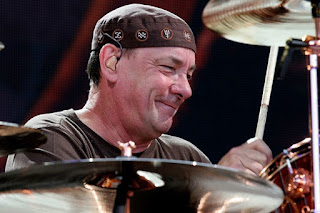There have been few big-name drummers who cared more or thought more deeply about drums and drumming than Peart. He may not have had the ability to make odd time signatures swing as effortlessly as Phil Collins, nor Bill Bruford's restless desire to never, ever repeat himself—to name two of the three other major prog rock drummers of the 70s—but no one ever strove for perfection like Peart. He'd spend months writing and rewriting and tweaking and honing and finally recording his parts, wondering if a flam here would be more effective or perhaps a ruff would work better or maybe it should simply be played as clean straight notes. And, of course, once the final part was settled, he'd meticulously recreate it night after night in concert, live, with tens of thousands of adoring eyes on him, and tens of thousands of adoring ears listening to every ghost note, every hi-hat bark, every perfect 32nd note paradiddlediddle.
And Peart, notorious perfectionist owner of staggering technical abilities, every one of which he worked relentlessly at, was open about how often he made mistakes. And, sure, he was almost certainly the only one who ever noticed them, but that's not entirely the point: the point is, he did notice them. And whereas a Collins would think, well, that sucks, but the show must go on, and push it out of his mind, and a Bruford would think, well, that didn't work but was really quite interesting, I wonder if there's anything to be learned from that, Peart would obsess over it, determined to do better next time. And the time after. And the time after.
And few professional musicians have ever dedicated themselves to reinventing their technique as late in their career as he did in the 90s, studying with master instructor Freddie Gruber, and changing up his approach to the drums—an idea which would have have been, was, beyond absurd to the generations of drummers would have given their left splash cymbal to have had half Peart's original technique.
But when I think of Neil Peart's drumming, I don't think of the title track to 2112, or the beloved instrumentals like "YYZ" or "La Villa Strangiato," I think about "Spirit of Radio," both because it's one of his finest lyrics, and most of all, because of the sense of humor and obvious love for music that comes through in every measure.
There are places where he seems to almost anticipate the gospel chops of the next century in his (perhaps Steve Gadd-inspired) linear fills, and it changes time signatures more often than most drummers change their socks, but it's the places where for measures on end he plays...the bass drum. Just unadorned quarter notes on the kick drum. The kind of thing he could have played after one lesson as a kid. Hell, the kind of thing he could have played before taking a single lesson. But it was right for the music, so monster drummer Neil Peart—who wrote the part—played the simplest thing possible. What's more, besotted (as the rest of the band was, along with pretty much everyone in the world was) at the time by the Police (and in Peart's case specifically the playing of the band's utterly dissimilar Stewart Copeland), he goes into...reggae. About as un-prog-like a musical style as is imaginable. But it felt right, it fit the song, so into reggae they went, by god.
Sure, there are those other parts where it goes into 7/4, 'cuz hey, that too fit. (And most amusing of all, when the song leaves 7/4 and goes back into 4/4, that's actually the measure which feels wonkiest, as the beat is displaced, ala "Sunshine of Your Love" or "Bell Bottom Blues." A tricksy bagginses, that Peart.)
The world has moved on. And we're unlikely to see the likes of a prog god like Neil Peart ever achieve mass popularity again. So pour one out for the reclusive percussionist, even though he'd probably hate it.

No comments:
Post a Comment